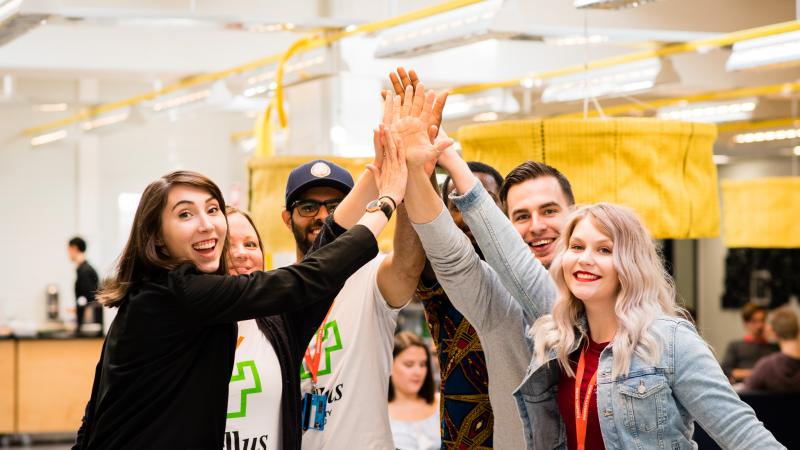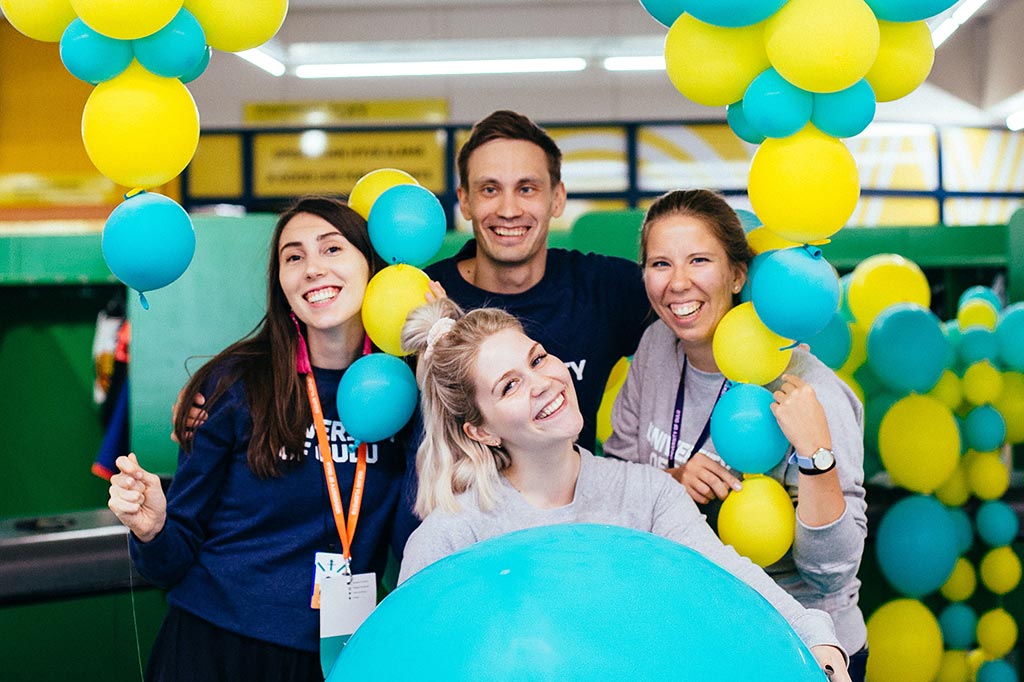The majority of all those who have completed the Self-Hack have done it at the University of Oulu. Niina Marostenmäki and Nina Jackson organised a big Self-Hack Day for all new students in autumn 2019. Since then, around 3000 students in Oulu have participated in Self-Hack at the beginning of their studies and 100 have acquired facilitator training.
Self-Hack came to Oulu University through a teaching development project and a lucky coincidence. Nina had worked on two projects focusing on developing students’ entrepreneurial skills (YYTO&YTYÄ). The startup entrepreneurship boom in Finland had really taken off after the 2015 SLUSH conference and the world record-breaking Finnish game companies. The boom had brought entrepreneurship support to the university world, and projects had been created in response. In addition to supporting the creation of growth companies, entrepreneurial skills were themselves recognised as important civic skills. Entrepreneurial skills were perceived as a response to the fourth industrial revolution, the perceived transformation of working life. It requires workers to be flexible in finding and creating work roles/identities for themselves as traditional job descriptions and career paths disappear.
Against this background, the University of Oulu had already organised business counselling and accelerator programmes. New students already had a common event at the beginning of their studies, where faculties shared problems for students to solve in teams. The purpose of this event was to encourage students to think independently and to create a team spirit among students. However, the Future Factory event was found to be more appropriate for a later stage of studies, when students’ subject knowledge and confidence in solving complex problems is more developed, rather than an orientation week. Entrepreneurship services, on the other hand, were only targeted at a small proportion of students who had grown into an entrepreneurial identity. Comprehensive entrepreneurship education was not an option. The problem was to get activities at the very beginning of the students’ entrepreneurial pathway that would activate them to think about their own studies and careers independently and thus practise the basics of entrepreneurial skills.
In 2019, Niina, who recently graduated with a Master’s degree in Education, was employed by the YYTO project and discovered the Self-Hack weekend event organised by the Oulu Entrepreneurship Society together with Creativity Squads. She attended the event because she felt it would be useful for a friend she had brought along. However, Niina was more enthusiastic about the event herself because she saw it as addressing many of the problems her fellow students were facing. Education did not guarantee secure jobs and it was anxiety-provoking for students to think about graduating, not knowing what would happen afterwards. Self-Hack provided the tools to work through the future in an encouraging and safe environment.
Self-Hack
Niina shared her experience of Self-Hack with Nina and after they both got excited about the idea, they started to take it forward at university. The aim was to create a Self-Hack as a common experience for new students at the start of their studies. So far, Self-Hack had been organised on weekends as two or three-day events. In Oulu, to facilitate the organisation of the Self-Hack, they wanted to shorten it to a one-day event, and in cooperation with Creativity Squads, a five-hour life-design hackathon was created
The planning and organisation of the event required a lot of work, not only in terms of organisation but also in terms of internal sales within the university. Niina stressed the importance of open communication and a proactive attitude in running the Self-Hack. In this way, questions from various university staff about the major project were answered. For many, it was enough to discuss and present the project with them, after which they were able to state that they felt it was working. This created a sense of ownership of the event. Self-Hack was organised separately for the education curricula planners, whom many turned to the advocates for the event. It was also good to link the Self-Hack to existing career guidance and study services, thus creating coherence within the university.
Here you can read about how Self-Hack is organised in universities like Oulu. https://www.oulu.fi/fi/self-hack
After a lively event in autumn 2019, the organising team got together to spend the evening and read student feedback on the event. They were surprised to find that the feedback was repeatedly very positive. It was clear from the feedback and from the discussions afterwards that the students really appreciated the event, which helped them to open up conversations with each other on in-depth topics and to spark new perspectives on the whole of their studies.
A dedicated course on facilitation was also created for Self-Hack facilitators, with the possibility to gain 5 study credits. Nina summarises a few tips for facilitators:
- It goes without saying that familiarising yourself with the material beforehand makes facilitation much easier. In addition to familiarising oneself with the material, one can ask colleagues or the authors of the material why an exercise works the way it does. It is not a good idea to start facilitating an exercise if you do not sign off on it yourself.
- The atmosphere should be kept light, the primary aim is not to complete the tasks but to generate good discussion.
- There is no one right way to do Self-Hack. Some groups are very talkative and insights seem to come from many sources, while some participants have many insights on paper and in their own minds, but prefer to keep them as insights. Either way is right.
In the autumn of 2020, the Covid pandemic forced the Self-Hack to be held remotely. The event was again successful, but different. In this case, the same kind of communal spirit between the students could not be established, which was unfortunate, but the Self-Hack self-reflection exercises played a more important role and the students got a lot out of them. The feedback received through the Covid-Autumn highlighted the challenges of time management and self-management that distance learning presented to students. Based on the feedback, Niina edited a special edition of the Self-Hack workbook focusing on the student’s everyday life. This version of Self-Hack was done by new students in autumn 2021, while universities were still closed.
The development of Self-Hack will continue in Oulu as Niina is responsible for developing the first-year experience for university students. After the project ended, Nina continued as an expert on collaboration between researchers and started her PhD studies in art education.

